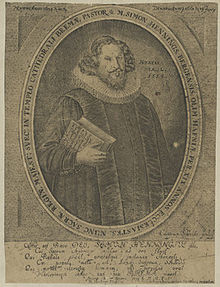Simon Hennings
Simon Hennings , also Simon Hennings the Elder (born April 19, 1608 in Bergen (Norway) , † July 19, 1661 in Easter village ) was a German Lutheran theologian and clergyman.
Life
Simon Hennings was the son of Pastor Ambrosius Hennings from Lübeck at the Marienkirche , the church of the Hanseatic merchants on Bryggen in Bergen. He grew up in Bergen until 1624 and then moved to Rostock University to study theology . In Rostock he received his master's degree in 1631. His sermons were already praised there, which is why he was invited to a trial sermon at the German Petrikirche in Copenhagen in 1632 . Hennings broke off the educational journey he had just started and was elected compastor. In Copenhagen he became the pastor of the Danish statesman and imperial court master Count Corfitz Ulfeldt , his wife Leonora Christina Ulfeldt and court preacher to the widowed Queen of Sweden Maria Eleonora of Brandenburg, who had lived in Copenhagen since 1640 .
Hennings, who was a very popular preacher in Copenhagen, was embroiled in a scandal over Corfitz Ulfeldt in 1651. He was accused of being the father of her child, who died soon after the birth, due to false statements made by the Dina Vinhofvers . Henning's wife had paired them up and Hennings himself had a paper that proves Ulfeldt's paternity, but did not want to hand it out. In addition, she claimed that Ulfeldt was seeking King Friedrich III. from Denmark after life. Although she was initially believed at court, Dina Vinhofvers then confessed to Hennings, who was also Ulfeldt's confessor , that her real lover Jørgen Walter was planning an assassination attempt on Ulfeldt. Hennings reported this to the king. The intriguer was sentenced to death for perjury . Even at the place of execution in front of the old Copenhagen Castle, she held on to her charges against Ulfeldt and Hennings.
Simon Hennings then left Denmark together with Ulfeldt and lived for a few years with his wife's relatives in Rostock, where he also gave lectures. In 1654 he traveled to Ulfeldt, who was staying in Stralsund , and with him to Stockholm . After a trial sermon in front of Alexander Erskein, he was recommended by King Karl X. Gustav of Sweden, who appointed him as the third preacher at Bremen Cathedral in 1655 in his capacity as Duke of Bremen-Verden . He retained this position until his death. The fact that he was subordinate to the unpopular main pastor Nicolaus Cüle despite his higher age and "better pulpit gifts" led to conflicts within the congregation. After a two-year illness, during which his son Ambrosius Hennings took his place, he died on a trip to Stade . The Bremen Superintendent Daniel Lüdemann gave him the funeral sermon, which was published like many of his own sermons. His grave slab still existing in 1828, the inscriptions of which have been handed down, have been lost.
Since 1632 he was married to Margaretha Lünsing, who was born in Rostock and with whom he had eleven children. His eldest son, Ambrosius Hennings (1638–1690), succeeded him as a preacher at the Bremen Cathedral and later as senior pastor at the Verden Cathedral . A younger son Simon Hennings (1644–1695) was also a theologian and pastor; he studied in Rostock, Rinteln and Kiel and in 1672 became pastor of the Holy Spirit Church in Rostock, later to St. Jakobi in Rostock.
literature
- Ludvig Holberg : Danish Empire History: Translated into German. With a complete register of all three parts , Volume 3, Korte, 1759, pp. 73 ff. ( Digitized version )
- Karl Ernst Hermann Krause : Hennings, Simon . In: Allgemeine Deutsche Biographie (ADB). Volume 11, Duncker & Humblot, Leipzig 1880, p. 781 f.
- Heinrich Wilhelm Rotermund : Lexicon of all scholars who have lived in Bremen since the Reformation, along with news from bored Bremen residents who held positions of honor in other countries , Volume 1, 1818; P. 198ff ( digitized version )
- The graves in Bremen's St. Petri Cathedral . Leaves of the "mouse". Society for Family Research e. V. Bremen issue 25 / November 2001
Web links
- Publications by and about Simon Hennings in VD 17 .
- Works by Simon Hennings
- Simon Hennings in Dansk Biografisk Leksikon
Individual evidence
- ^ Entry 1624 in the Rostock matriculation portal
- ↑ Entry 1631 in the Rostock matriculation portal
- ↑ See also on the website of the St. Petri Church in the register of persons.
- ^ Heinrich Wilhelm Rotermund: Lexicon of all scholars who have lived in Bremen since the Reformation, along with news from bored Bremen residents who held positions of honor in other countries , Volume 1, 1818; P. 199
- ^ Heinrich Wilhelm Rotermund: The learned Hanover or lexicon of writers, learned businessmen and artists who have lived and are still alive since the Reformation in and outside of all the provinces belonging to the current Kingdom of Hanover . Volume 1, 1823; P. 418
- ^ Entry in the Verden local family register
| personal data | |
|---|---|
| SURNAME | Hennings, Simon |
| ALTERNATIVE NAMES | Hennings, Simon the Elder |
| BRIEF DESCRIPTION | German Lutheran theologian and clergyman |
| DATE OF BIRTH | April 19, 1608 |
| PLACE OF BIRTH | Bergen (Norway) |
| DATE OF DEATH | July 19, 1661 |
| Place of death | Easter village |
